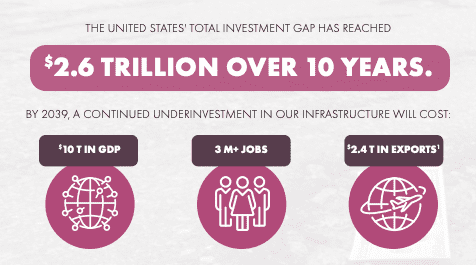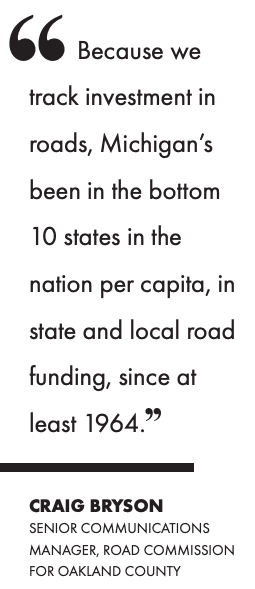A Crisis of Cost
April 12, 2022By Rene Wisely

It’s unsexy but necessary. Often hidden and yet it’s part of every Michigan resident’s daily life. And it’s almost always ignored. Michigan’s current infrastructure receives the Rodney Dangerfield treatment: It gets no respect.
“We tend to only respond when it’s a crisis,” said Lance Binoniemi of the Michigan Infrastructure and Transportation Association.
Over the past decade or more, Michigan has had one infrastructure crisis after another. Failed dams and crumbled bridges. Pothole-riddled roads. Flooded streets and sewer back-ups.
And more of these crises are on the horizon. Michigan relies on many systems that date back to the late 1800s, with age serving as infrastructure’s worst nemesis.
How did Michigan let that happen? How did we get here?
The Money Equation
It’s all about money. Michiganders have resisted paying more to fund long-term infrastructure investment, Binoniemi said. For legislators, it’s a political hot potato, that’s prevented sustainable financing solutions.
Michigan has trailed most of the nation in road funding for the past 55 years, said Craig Bryson, senior communications manager of the Road Commission for Oakland County, which takes care of 2,700 miles, the largest county road system in the state.
“Because we track investment in roads, Michigan’s been in the bottom 10 states in the nation per capita, in state and local road funding, since at least 1964,” said Bryson.
nation per capita, in state and local road funding, since at least 1964,” said Bryson.
And don’t dare compare Michigan’s roads with Ohio’s, Bryson said. Ohio motorists pay gas taxes of 38.5 cents per gallon. In Michigan, its 26.3 cents. Those extra 12 cents per gallon mean an extra $1 billion a year for Ohio’s roads.
“That adds up over time,” he said.
Going back in time, any gains Michigan had from federal programs in the 1950s-1980s, vanished during the Great Recession.
Recent Funding Bright Spots Fall Short
Former Gov. Rick Snyder passed a $1.2 billion road funding bill in November 2015 that raised the cost to register a vehicle, the first significant one in 20 years, and upped the gasoline tax by 7.3 cents per gallon. This came only after voters overwhelmingly said no to the Proposal 1 transportation package the previous May, which the Detroit Regional Chamber supported as a sustainable, long-term way to pay for roads. The previous gas tax increase was 4 cents in 1997, half of what was requested.
Michigan Gov. Gretchen Whitmer in her first State of the State address in 2019 suggested a 45-cent gas tax increase, a necessary amount to fix the potholeridden roads she campaigned on, which was expected to raise $2.5 billion annually.
The legislature said no, so she used a $3.5 billion bond stretching over five years to work on roads, which wasn’t enough, Binoniemi said.
Local Agenda
Other communities study Grand Rapids’ Vital Roads program, where residents voted for a tax increase in 2014 to shore up its own roads and embrace an asset management system.
“We coordinate all our road projects with all of our other utilities, public and private, so everything is done at the same time,” with less construction headaches and results in long-term savings, said Eric DeLong, Grand Rapids’ deputy city manager.
Proper infrastructure leads to improving a resident’s quality of life and that is the key to good governing, said Macomb County Board of Commissioners Chair Don Brown.
“No one cares if the toilet flushes just fine,” Brown said. “It’s when that waste backs up in your house or ends up in Lake St. Clair and causes an algae bloom that people care.”
Rene Wisely is a freelance writer in Metro Detroit.
